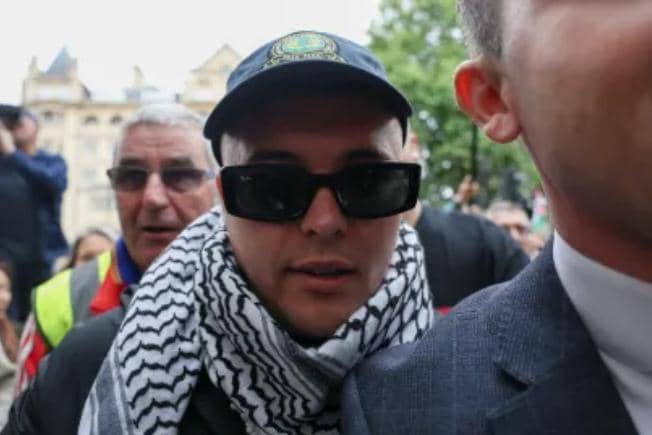(DDM) – Hundreds of protesters filled the streets outside Westminster Magistrates Court in London on Wednesday, rallying behind Liam Óg Ó hAnnaidh, widely known as Mo Chara, a member of the politically charged Irish rap group Kneecap.
Diaspora Digital Media (DDM) gathered that Mo Chara has been charged with allegedly displaying a Hezbollah flag during a performance in London in 2024. The Lebanese organization is classified as a terrorist group under UK law.
The case has sparked global conversations about free speech, artistic expression, and the extent of counterterrorism measures in democratic societies.
Mo Chara has firmly denied the allegations, calling the case a “carnival of distraction” designed to divert attention from the ongoing humanitarian crisis in Gaza.
Court Drama and Public Outcry
Supporters waved Palestinian flags and held banners as the 27-year-old rapper arrived at the courthouse, escorted by fellow bandmates Naoise O Caireallain and JJ O Dochartaigh.
Chants of “Free Mo Chara” filled the air as photographers struggled to capture the dramatic scene amid a chaotic press scrum.
Inside the courtroom, legal arguments centered on whether the case had been brought within the six-month statutory limit required for such charges.
Judge Paul Goldspring adjourned the matter until September 26, 2025, when he will issue a decision on whether the trial will proceed.
Mo Chara spoke briefly, confirming his name, date of birth, and address, but refrained from entering a plea.
As he exited, protesters renewed their chants, calling on the authorities to “drop the charges now” and vowing to return in even larger numbers at the next hearing.
Background on Kneecap and UK Terror Laws
Formed in Belfast in 2017, Kneecap is known for its unapologetically political lyrics, often performed in the Irish language, and for addressing themes such as nationalism, resistance, and social inequality.
The band rose to international prominence following performances across Europe and the United States, including a high-profile appearance at the Coachella music festival in California in early 2024.
During the Coachella performance, the group displayed messages condemning Israel’s military campaign in Gaza, further fueling debate about their political stance.
Under the UK’s Terrorism Act, displaying or wearing symbols associated with a proscribed organization can be considered an offense, even when done in the context of political protest or artistic performance.
Free Speech or National Security?
Critics argue that the charge against Mo Chara reflects an overly broad interpretation of counterterrorism laws, one that risks stifling legitimate political expression.
Supporters contend that the rapper’s actions fall squarely within the realm of artistic commentary and should not be criminalized.
Civil rights groups have described the prosecution as part of a growing trend in which political symbols are policed with increasing rigidity, particularly in cases relating to Middle Eastern conflicts.
Observers warn that the outcome of the September hearing could set a major precedent, either reinforcing or relaxing how far artists can go in expressing controversial views through their work.



